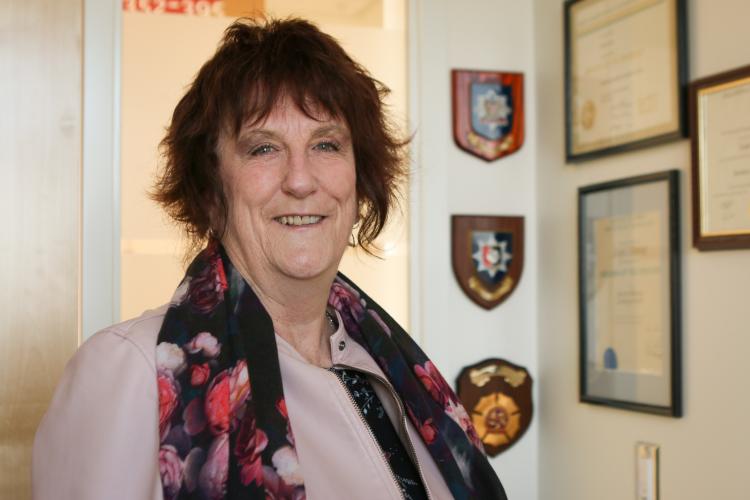
VIU Health and Human Services (HHS) Professor Dr. Leigh Blaney receives award to help with development of prototype video game. Photo Credit: Vancouver Island University, Robert Fell
Vancouver Island University (VIU) Health and Human Services (HHS) Professor Dr. Leigh Blaney is branching out into the world of video game development.
A BC SUPPORT Unit grant of $10,000 will help Blaney and her research partner Robert Fell, a volunteer firefighter and owner of tech company HYPERSURGE, develop a prototype firefighter resilience education video game called Firefighter Edge that can be used in resilience training worldwide.
For many first responders, the cumulative exposure to trauma can overwhelm their coping skills, triggering a mental health crisis. Drawing on more than 25 years of experience working in critical incident stress management with firefighters, Blaney has co-created a resilience education program aimed at helping volunteer firefighters in BC learn different ways of thinking about and reacting to anxiety-causing situations and how to cultivate their personal resilience before they are involved in a disturbing incident.
The in-person training program was rolled out in 2018 and showed positive results. Conversations around the firehall began to change, and firefighters started using strategies such as mindfulness and positive reframing to build their personal capacity to manage anxiety and stress.
"There is evidence that building resilience can be taught and practiced, and that education increases resilience scores in a statistically significant way," says Blaney.
With the onset of COVID-19, face-to-face resilience education training came to a halt and hopes of extending the program to all 10,000 volunteer firefighters in BC were also put on hold.
The BC SUPPORT Unit Vancouver Island Centre connects researchers with patients and families living in the area served by Island Health and offers services to support and increase Patient-Oriented Research (POR). POR is part of Canada's Strategy for Patient-Oriented Research (SPOR) led by the Canadian Institutes of Health Research (CIHR). The strategy engages patients (an overarching term inclusive of individuals with personal experience of a health issue and informal caregivers including family and friends) to become research partners, helping to ensure the research focus is on patient-identified priorities to improve patient health outcomes.
"Firefighter Edge combines resilience research evidence with the lived experiences of firefighters," says Dr. Uta Sboto-Frankenstein, Research Navigator with Island Health and the BC SUPPORT Unit Vancouver Island Centre. "It is the unique expertise of Dr. Leigh Blaney and Mr. Robert Fell that enable a truly transformational Research to Action approach where research evidence is put into practice through the integration into a video game. Resilience research evidence and education are taken beyond the classroom and into the homes of our front-line workers. We are delighted to be part of this process." says Sboto-Frankenstein.
The patient-oriented Research-to-Action grant will fund the development of the prototype game, which will then be trialed by fire service partners on southern Vancouver Island.
"It's a really unique way of delivering education that we have talked about for well over a year," says Blaney. "It was Rob's idea to create the game. He gave me access to a game he developed for the Ministry of Defense in the United Kingdom, and after playing it for two hours I was fully engaged in it, and I am not a gamer. The process of knowledge and skill development as you work through these games is very interesting and convinced me this could be a useful tool. The firefighters we've talked to about the game are also super excited about."
Blaney says the project has active support from Langford and Sooke fire rescue services, who have been enthusiastic participants and supporters in firefighter research over the years.
"They will act as project advisors' to ensure that the game and the curriculum are relevant to firefighters."
Additional funding is being sought to continue with phase two of the research project: providing access to BC firefighters on a trial basis, measuring resilience scores before and after, and measuring the success of the game through the continued play and increased skill level of the player. Blaney and Fell see value in having tangible evidence of the effectiveness of the game.
"This is a good way of seeing whether or not game-based learning works, which certainly research evidence shows that it does," adds Blaney. "Does this particular curriculum engage firefighters? And then the next step after that, of course, is to roll it out to other contexts such as emergency services and health care."
If the game proves successful, Blaney and Fell want to launch it nationally and internationally, if they can secure financial support.











